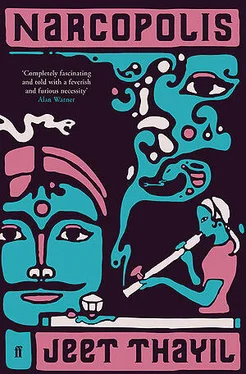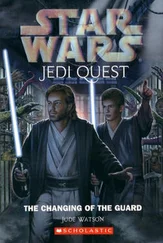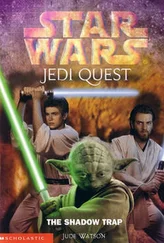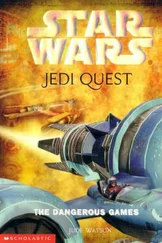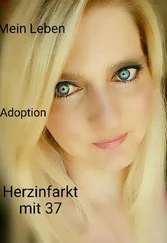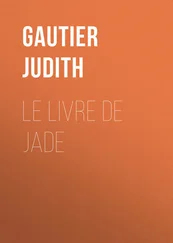Right then, a pimp said, ‘“Everybody’s dying, even he, even she. / Knowing this, how can you not feel pity?”’
Rashid rolled his eyes and took a pull of the pipe and a suck at the joint.
‘There used to be thirty-six chandu khanas on Shuklaji Street,’ he said, ‘now mine is the last one, perhaps the last one in the whole city. If you stand on the balcony and look out some nights, you’ll think it’s the last chandu khana on earth. And it too will soon be gone. What else will be gone? The words we said and the people we knew, and you and me, all of us will be sucked away like smoke in the wind. Do you know what will come in our place? New business, and if you want to do new business you’ll have to pray to the same god as your client.’ He licked his finger and wet the joint’s burning tip. ‘Nasrani,’ he said, ‘are you listening?’
Before I could reply the hijra in the stained sari reappeared and it was our turn. Rumi and I jumped up and went inside.
*
The hijra led us behind a partition to a back room where the Nigerian sat at a desk. A plastic jug of water stood on a side table, with a saucer of used tea bags and a collection of small bottles. There were several brands of laxatives and a bottle of cough syrup. On a room-service tray were a dozen or so latex eggs, washed, but large enough that I wondered how he’d managed to put them in his ass. He wore a fresh skullcap and a striped business shirt and his shoes had a deep shine. There was a prayer bruise on his forehead and behind gold-rimmed spectacles his eyes were clear. He introduced himself as Pepsi and apologized for the delay. It was difficult to shit knowing a crowd of people was waiting, he said. Then he cut two uneven lines of dirty white powder on the cover of a movie magazine. He handed Rumi a hundred-rupee note rolled very tight. The twin lines ran diagonally across the famous mouth and vertiginous cleavage of the actress on the magazine’s cover. Rumi bent over the currency note and snorted up a line and closed his eyes and put his fingers in his ears. I broke my line in two, one for each nostril. The powder hit the back of my nose with a hard chemical burn, and, in an instant, my knees dissolved in the anhydride rush that disconnects neurons from nerve endings, obliterates bone and tissue, and removes anxiety by removing all possibility of pain. I thought: If pain is the thing shared by all living creatures, then I’m no longer human or animal or vegetal; I am unplugged from the tick of metabolism; I am mineral.
*
Rumi and Pepsi were on the couch, smoking a joint of heavy Bombay black, afloat on the smoke and conversation. The Mandrax man was there too, bent, his eyes wide with understanding or stupidity. The hijra, on the floor, smoked tiny bits of powder on a strip of tin foil. She cut an empty Gold Flake packet into long tapers that she lit from a candle and held to the foil, and when the powder melted and a coil of smoke appeared she sucked it through a foil-lined straw. She held the drag deep in her lungs until it disappeared into her cells where it mutated and multiplied. Her hair was cut very short and there was a wound on her chin, a deep excavation filled with mucus. I was watching her, I couldn’t look away, and when she caught me looking her eyes filled with water and that was when I realized it was Dimple and I was ashamed that it had taken me so long to recognize her. She pointed at the hole in her chin but she didn’t speak. I’d seen her last about ten years earlier, when she’d been Rashid’s personal pipe maker and known for her beauty. There was no trace of it now in the white stubble on her cheeks and the thin honey-coloured hair. We had once been friends, but I’d never thought of coming to see her or to ask after her. There was always some sort of crisis, a crisis every day, and heroin trumped friendship every time. Now, I did the easy thing: I took the money out of my pockets, kept some for a taxi home and what was left I put on the floor beside her. It amounted to a little over six hundred rupees. I wanted to do something more but the truth of it was I was too high to care. In a corner a television flickered: mute images of healthy men and women, white, running in slow motion on a beach. There was clean sand and sunshine, the water clear, the colour so vivid it seemed as unreal as the people running in their tight swimsuits. I said something, I don’t remember what, and Dimple tried to look up but she couldn’t, the nod was too heavy.
*
I thought: For every happiness there is an equal and opposite unhappiness. Then I took a drag of charas and the room filled with light. Everything was transparent. The skin on my arms was as thin as paper. I looked into my flesh and saw the moving bones wrapped in pink translucent sheets; and all the while the rain fell in great washes against the roof, sheets of water that streamed from the windows and gathered in the corners of the room. We smoked that dirty hash, Bombay black charas with the colour and texture of goat shit, and we chased heroin on strips of foil. We spoke those words, the beautiful ones without meaning or consequence. We laughed for no reason and interrupted our laughter with silence. Pepsi spread a prayer mat and prayed and we waited in the room where the television flickered like firelight and the rain gurgled and crashed. We smoked. People came and went. We spoke the beautiful words and we called heroin by its joyful name. I didn’t sleep but I was full of dreams and when I made my way outside it was dawn. The rain had thinned. Everything was lit with meaning. Water lapped against the city’s ruined buildings, dirty water strewn with petals and garbage and smelling of attar. People waded on the street, soaked to the skin, their faces ecstatic in the charcoal light. I knew them as my brothers as I stood in the rain. I spread my pitiful, deluded arms wide. I wanted to hold the city, each woman and child and animal and man. I wanted to save them. And then I saw Dimple on the balcony reading a book, squinting as if her life depended on the words. When she saw me she stood up. There was a piece of sticking plaster on her chin and she said something I didn’t understand, or maybe I did understand but I don’t remember. I went to say goodbye and she whispered something in my ear, repeated what she’d said earlier or said something else, though I still didn’t understand until I saw the Air India carry case in her hands. She had packed her belongings and she’d been waiting for me on the balcony. It was still raining and below us the floodwater suddenly seemed very deep, though I knew it wasn’t. Dimple watched a puddle form on the balcony. She said, Take me with you. I’ll die if I stay here.
*
What excuse could I have made, other than the fact that I was leaving and I had nowhere to take her? And then it occurred to me that it wasn’t true, there was a place she could go. We set off as if it was the most natural thing to do, set off together, I carrying her case, Dimple looking straight ahead, concentrated on the task of climbing down the flimsy wooden staircase, and only I looked behind to see if anyone had noticed that we were leaving, Rashid maybe, or one of his minions, lumbering after us, but no one was there. The water had receded a little and we found a taxi on the main road. Dimple was silent until we passed the waterfront near Worli and then she recalled something someone once told her, that the only beautiful thing about Bombay was the sea. She said it wasn’t true, there were other things that were beautiful, though at the moment she couldn’t think of a single one. After a while, she asked when we would be passing Chowpatty Beach and I told her that it was behind us, but she looked so stricken at this that I asked the cabbie to turn around and take us back. We parked on the road and walked a little way onto the beach, which was deserted at that time. The sea was swollen with waves and rain. There were no birds in the sky, or there were fluorescent birds that piped harsh melodies, birds that revealed themselves to be kites, and moments later revealed themselves to be not fluorescent at all but transparent, and not kites but crows, transparent albino crows barking dissonance, not melody, and Dimple crouched under the terrible sky wheeling with luminous birds and asked me if I could see the lights of a ship where the horizon was. I followed where her finger pointed but saw nothing, because the sea was full of chop and rain. I don’t remember what I said in reply, or whether I replied at all, but just then I experienced a moment of clairsentience, a feeling of longing and anxiety, Dimple’s, and for a moment I saw what she saw, a lost junk with tattered sails that seemed to have travelled a great distance of time, from the past into the future, with too few stops for refuelling and repairs. And I knew that she wanted the ship to send a boat to collect her and take her away, take her somewhere calm and clean, where she could rest and repair her own wounds, and just then, just as I felt her sadness settle in my chest, she got up and went back to the taxi.
Читать дальше
